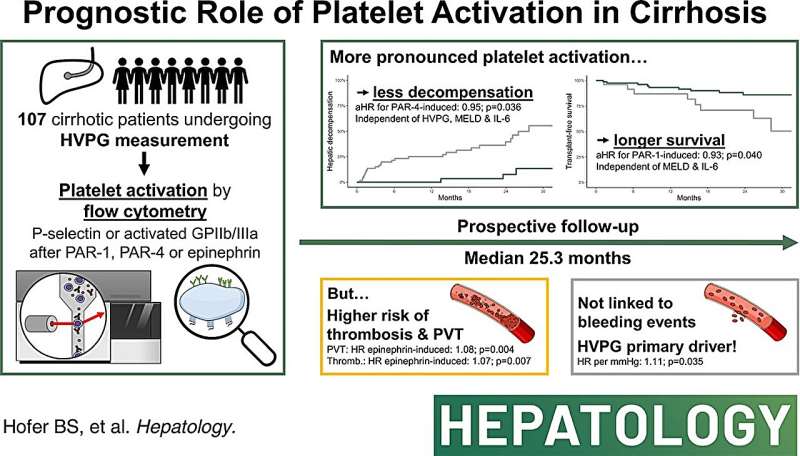This article has been reviewed according to Science X's editorial process and policies. Editors have highlighted the following attributes while ensuring the content's credibility:
fact-checked
trusted source
proofread
Findings shed light on the role of platelets in patients with cirrhosis

Next to other complications, cirrhosis is also linked to abnormalities in hemostasis. However, the role of alterations in platelet function had previously been insufficiently investigated.
Now, researchers at the Medical University of Vienna have shed light on the connection between platelet function and the risk of bleeding, thrombosis, or the occurrence of complications of cirrhosis. The study results, recently published in the journal Hepatology, may help to improve the understanding of the risk profile of patients with cirrhosis and point to new possibilities for personalized therapeutic approaches.
The research team led by Benedikt Hofer, Thomas Reiberger, and Thomas Gremmel from Med Uni Vienna and the Vienna General Hospital analyzed the platelet function of 107 patients with cirrhosis who were treated at the Vienna General Hospital between July 2019 and December 2020. The presence of cirrhosis, i.e., the deposition of scar tissue within the liver, can lead to many complications and can significantly alter blood clotting.
However, the widespread opinion that cirrhosis is, therefore, associated with a higher bleeding risk does not stand up to the latest research findings. "Recent studies have led to a paradigm shift in the understanding of coagulopathy in cirrhosis by showing that factors promoting the risk of bleeding are counterbalanced by prothrombotic alterations. This results in a very unstable balance of hemostasis in cirrhosis, and patients not only have an increased risk of bleeding but also of thrombosis," explains study author Thomas Reiberger.
In order to accurately analyze platelet activation, the researchers used flow cytometry in their study. "To understand altered blood clotting in cirrhosis, it is essential to first understand all relevant aspects, especially platelet function," says first author Benedikt Hofer.
Many patients with liver disease show a reduced platelet count, i.e., thrombocytopenia, which can significantly impair the validity of most common methods of measuring platelet function. In contrast, flow cytometry provides valid results even in patients with a very low platelet count.
Evidence for prognostic implications
Using flow cytometry, the study revealed that the ability of platelets to respond to stimuli adequately decreases significantly as the severity of the underlying liver disease progresses. In a further analysis, the researchers also showed that this reduction in platelet activation is associated with a significantly higher risk of complications of cirrhosis and shorter survival.
"Our results clearly show that impaired platelet function is associated with a significantly poorer prognosis—regardless of the severity of cirrhosis," the authors write.
Conversely, there was also an association between pronounced platelet activation and an increased risk of thrombosis in the included study population. With regard to the risk of bleeding events, the researchers did not find a link to altered platelet activation. The results of this study not only shed new light on the importance of platelet function in cirrhosis but also offer the possibility of personalized therapeutic approaches and a better understanding of the risk profile of patients with cirrhosis.
More information: Benedikt Silvester Hofer et al, Decreased platelet activation predicts hepatic decompensation and mortality in patients with cirrhosis, Hepatology (2023). DOI: 10.1097/HEP.0000000000000740




















